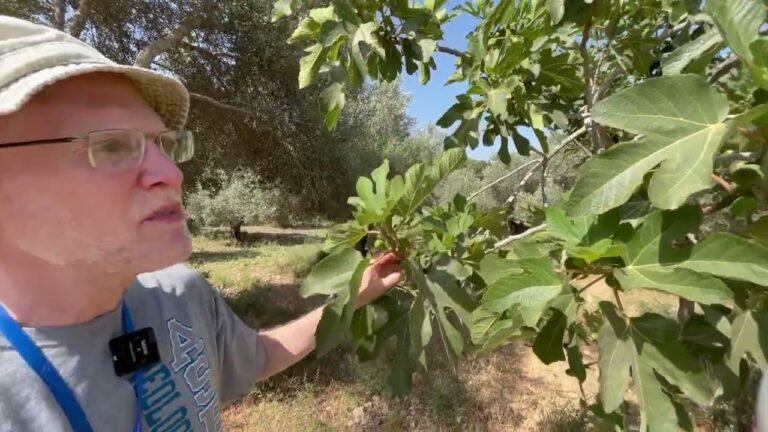The Enigma of Jesus and the Fig Tree
In the Bible, the story of Jesus and the fig tree has been a source of contemplation and interpretation for centuries. This powerful and enigmatic tale has sparked curiosity and debate among scholars and believers alike. The significance of this encounter, and its lessons on faith and spiritual fruitfulness, continue to captivate and inspire those who seek to understand the deeper meanings behind Jesus’ actions. Join us as we delve into the timeless story of Jesus and the fig tree, and uncover the profound truths it holds for our lives today.
What is the significance of Jesus cursing the fig tree in the Bible?
In the Bible, the significance of Jesus cursing the fig tree is often interpreted as a symbolic act of judgment against Israel for its spiritual barrenness and lack of faith. By withering the fig tree, Jesus was demonstrating the consequences of a lack of genuine fruitfulness and obedience to God. This event serves as a powerful reminder for believers to have faith and produce good works, rather than just outward appearances of religiosity. Additionally, it reinforces the importance of bearing spiritual fruit in our lives as a sign of our relationship with God.
Did the fig tree actually wither immediately after Jesus cursed it?
The fig tree withered immediately after Jesus cursed it, demonstrating his power and authority. This miraculous event served as a symbolic lesson for his disciples, highlighting the importance of genuine faith and the consequences of spiritual fruitlessness. The immediate withering of the fig tree showcased Jesus’ ability to bring about immediate and undeniable outcomes, reinforcing the significance of his teachings and the necessity of bearing spiritual fruit in one’s life.
Why did Jesus curse the fig tree if it wasn’t even the season for figs?
Jesus cursed the fig tree as a symbolic act to teach a lesson about faith and spiritual fruitfulness. The tree, though it wasn’t the season for figs, still should have had some early fruit or at least leaves indicating that it would bear fruit later. By withering the tree, Jesus was demonstrating the importance of genuine faith and the consequences of spiritual barrenness. This powerful action served as a warning to his disciples and the people around him to not just appear fruitful on the outside, but to bear true spiritual fruit from within.
The cursing of the fig tree also served as a metaphor for the spiritual state of the religious leaders of the time. Just as the tree appeared to have the potential for fruitfulness but was ultimately barren, the religious leaders were outwardly religious but lacked true spiritual substance. Jesus used this event to challenge the hypocrisy and lack of genuine faith among the religious elite, urging them to bear good fruit and lead others in the ways of true faith.
What does the story of Jesus and the fig tree teach us about faith and spiritual growth?
The story of Jesus and the fig tree teaches us about the power of belief and the importance of spiritual nourishment. In the story, Jesus curses the fig tree for not bearing fruit, symbolizing the consequences of a lack of faith and spiritual growth. This teaches us that without a strong foundation of belief and spiritual nourishment, we cannot expect to see the fruits of our labor. It reminds us that faith is essential for our spiritual growth, and without it, we may find ourselves feeling barren and unfulfilled.
Furthermore, the story serves as a reminder of the need for consistent spiritual growth and development. Just as the fig tree required ongoing care and attention to bear fruit, our faith and spiritual life also require continuous nurturing. We must regularly tend to our spiritual well-being through prayer, meditation, and acts of kindness in order to see meaningful growth and transformation in our lives. The story of Jesus and the fig tree challenges us to cultivate a deep, unwavering faith and to actively seek spiritual growth in order to live a fulfilling and abundant life.
Unraveling the Mystery of Jesus’ Encounter with the Fig Tree
In the Gospel of Mark, the story of Jesus cursing the barren fig tree has puzzled many readers for centuries. Some see it as a mere demonstration of Jesus’ power, while others interpret it as a symbolic act of judgment. By examining the context of this event within the broader narrative of Jesus’ ministry, we can begin to unravel the deeper meaning behind this seemingly enigmatic encounter. Perhaps it serves as a powerful reminder of the importance of bearing spiritual fruit and the consequences of spiritual emptiness.
As we delve deeper into the layers of symbolism and metaphor within this story, we are confronted with the challenging question of what it means to truly live a life of faith and obedience. Just as the fig tree was expected to bear fruit in its season, so too are we called to live out our faith in tangible ways. Jesus’ encounter with the fig tree serves as a sobering reminder that a life devoid of spiritual fruit is ultimately unfulfilling and subject to judgment. Through reflection on this passage, we are invited to examine our own lives and consider how we can bear fruit that glorifies God and brings life to those around us.
Decoding the Significance of Jesus and the Fig Tree
In the Gospels, Jesus’ encounter with the fig tree holds a deeper meaning that transcends its literal interpretation. The fig tree symbolizes Israel and its spiritual barrenness at the time of Jesus. By cursing the fig tree, Jesus was illustrating the consequences of a lack of faith and spiritual fruitfulness. This powerful metaphor serves as a warning to all believers to remain rooted in faith and bear good fruit in their lives.
Furthermore, Jesus’ actions towards the fig tree demonstrate his authority over nature and his divine power. Just as he withered the fig tree with a mere word, Jesus has the ability to bring about both physical and spiritual transformation in our lives. This miracle serves as a reminder of Jesus’ sovereignty and his ability to bring about change in the most unexpected ways. It challenges us to trust in his power and have faith that he can bring new life where there seems to be only barrenness.
Ultimately, the significance of Jesus and the fig tree lies in the message of hope and redemption that it conveys. Despite the withering of the fig tree, Jesus offers the promise of new life and spiritual renewal to all who believe in him. Just as the fig tree was given a second chance to bear fruit, we too are offered the opportunity to turn towards Jesus and experience the abundant life that he offers. This powerful symbol serves as a reminder of the transformative power of Jesus’ love and grace in our lives.
In the story of Jesus and the fig tree, we are reminded of the importance of faith and the power of belief. Just as Jesus cursed the barren fig tree for not bearing fruit, we are called to examine our own lives and ensure that we are living in alignment with our values and beliefs. This powerful lesson serves as a reminder to stay true to ourselves and to always strive for growth and abundance in all aspects of our lives.







